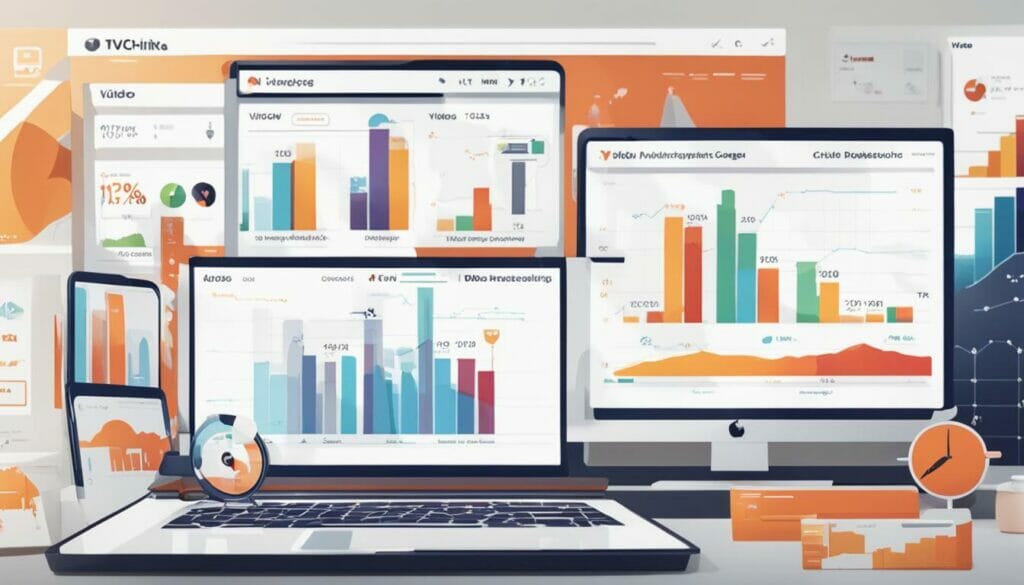Winning Digital Marketing Strategies for Small Businesses
In this digital age, having a strong online presence is essential for small businesses to thrive. With the right digital marketing strategies, you can improve your visibility, attract new customers, and drive sales. In this section, we will explore the importance of digital marketing for small businesses and provide an overview of effective strategies for boosting your online presence.
Key Takeaways
- Small businesses need a strong online presence to thrive in the digital age.
- Digital marketing strategies can improve visibility, attract new customers, and drive sales.
- Effective digital marketing strategies for small businesses include SEO, social media marketing, content marketing, and more.
Understanding the Power of Online Marketing
If you're a small business owner, you know how important it is to have a strong online presence. With so many consumers turning to the internet to find information and make purchases, digital marketing strategies for small business are essential for success.
Online marketing encompasses a wide range of techniques and platforms, including SEO, social media marketing, email marketing, video marketing, and more. By utilizing these strategies, small businesses can reach a wider audience and compete with larger companies on a level playing field.
Implementing effective online marketing tips can help you increase brand awareness, attract new customers, and drive sales. In the following sections, we'll delve deeper into some of the most powerful digital marketing strategies for small business and provide actionable tips to help you succeed.

Harnessing the Potential of SEO for Small Business
Search Engine Optimization (SEO) can be a game-changer for small businesses looking to improve their online visibility and attract more customers. By optimizing your website for search engines, you can rank higher in search results and drive more traffic to your site. Here are some tips on how to make the most of SEO for your small business.
1. Conduct Keyword Research
Before you start optimizing your website, research relevant keywords that potential customers might use to find your products or services. Use tools like Google Keyword Planner or Ubersuggest to identify high traffic keywords with low competition. Incorporate these keywords into your website content, including your page titles, meta descriptions, and headings.
2. Optimize Your Website Structure
Make sure your website is user-friendly and easy to navigate. Use clear and descriptive URLs, and organize your content into categories or sections. Ensure your website is mobile-friendly and has a fast page loading speed. These factors can significantly impact your ranking on search engines.
3. Create Quality Content
Content is king when it comes to SEO. Create high-quality, informative content that is relevant to your target audience. Use keywords naturally and avoid keyword stuffing. Incorporate multimedia elements, such as images and videos, to make your content more engaging.
4. Build Quality Backlinks
Backlinks are links from other websites that point to your site. They signal to search engines that your website is a valuable resource. Build quality backlinks by creating shareable content, guest posting on other relevant websites, and engaging with influencers in your industry.
5. Monitor and Analyze Your Results
Track your website's performance regularly using tools like Google Analytics. Analyze your traffic sources, bounce rate, and other key metrics to identify areas for improvement. Use this data to refine your SEO strategy and drive better results.

Maximizing Social Media Marketing for Small Business
Social media marketing is a crucial component of any successful digital marketing strategy for small businesses. With billions of active social media users worldwide, tapping into this platform can help you reach a wider audience, engage with potential customers, and build brand awareness.
To make the most out of social media, you need to create an effective social media strategy. This includes:
- Identifying your target audience and selecting relevant social media platforms
- Creating engaging content that resonates with your audience
- Utilizing various content formats, such as images, videos, and infographics
- Staying consistent with your posting schedule
- Engaging with your followers and responding to comments and messages
One of the key benefits of social media marketing for small businesses is the ability to target specific audiences. Through detailed audience targeting options available on platforms like Facebook, Instagram, and LinkedIn, you can reach your ideal customers based on factors such as age, location, interests, and behavior.
Additionally, social media provides an opportunity to build brand loyalty by engaging with your followers and showcasing your brand's personality and values. Sharing user-generated content, running giveaways, and responding to customer feedback are just a few ways to boost customer engagement and loyalty on social media.
Lastly, it's important to track and measure your social media performance to ensure your efforts align with your marketing goals. Tools like Facebook Insights, Twitter Analytics, and Hootsuite Analytics allow you to monitor your social media metrics and adjust your strategy as needed.

In conclusion, social media marketing is a powerful tool for small businesses to reach a wider audience, engage with potential customers, and grow brand awareness. By creating an effective social media strategy and staying consistent with your efforts, you can maximize the potential of social media to drive business success.
Effective Content Marketing Strategies
Content marketing is the backbone of any successful digital marketing strategy. By creating valuable and relevant content, you can attract and retain customers, increase brand awareness, and drive conversions. Here are some effective content marketing strategies to boost your online presence:
- Establish your brand voice: Define your brand's personality and tone of voice to make your content more relatable and engaging.
- Create quality content: Focus on creating high-quality content that is relevant to your target audience. Use visuals, such as images and videos, to make your content more enticing.
- Optimize your content: Use relevant keywords in your content to improve search engine optimization (SEO) and make it easier for potential customers to find your website.
- Use different content formats: Mix up your content with different formats, such as blog posts, infographics, videos, and podcasts, to keep your audience engaged.
- Utilize social media: Promote your content on social media platforms to reach a wider audience and increase engagement.

By following these content marketing strategies, you can create valuable content that resonates with your target audience and drives growth for your small business.
Local Business Marketing Techniques
Small businesses rely heavily on their local communities for customers. Therefore, it's essential to implement effective local business marketing techniques to boost visibility and attract potential customers. Let's explore some ways to improve your local online marketing strategy:
| Technique | Description |
|---|---|
| Local Search Optimization | Optimizing your website for local search is critical. Ensure your website contains relevant information such as your business name, address, and phone number. Claim and update your Google My Business listing to appear on Google Maps and other relevant search queries. |
| Customer Reviews | Positive reviews play a vital role in attracting new customers. Encourage satisfied customers to leave reviews on your website, Google My Business, and other relevant directories. |
| Local Directories | List your business on local directories such as Yelp, Yellow Pages, and other specialized directories relevant to your industry. |
By implementing these local business marketing techniques, you can increase your online visibility and attract more local customers to your business.

Effective Email Marketing Tactics
Email marketing is a powerful tool for small businesses to nurture customer relationships and drive conversions. With email marketing, businesses can reach their target audience directly and customize their messaging to match their audience's interests and needs. Here are some effective email marketing tactics:
Create a Solid Email List
The first step to a successful email marketing campaign is creating a solid email list of subscribers who have opted in to receive your emails. Make sure to include a sign-up form on your website and social media pages, and offer incentives such as exclusive content or discounts to encourage sign-ups.
Create Engaging Content
Your email content should be engaging and informative. Include personalized messaging to make your subscribers feel valued and appreciated. Keep the focus on providing value and avoid excessive sales pitches.
Optimize Email Campaigns
Optimize your email campaigns to improve open and click-through rates. Use compelling subject lines, segment your list based on interests and behavior, and test different formats and designs to see what resonates with your audience.

By implementing these email marketing tactics, small businesses can create effective campaigns that drive engagement and conversions. Remember to always track and analyze your results to refine your strategy over time.
Leveraging the Potential of PPC Advertising for Small Business
Pay-Per-Click (PPC) advertising is an effective way for small businesses to drive targeted traffic to their websites. By placing ads on search engine results pages, social media platforms, or other websites, you can reach potential customers who are already interested in your products or services. Here are some tips to help you set up and manage your PPC campaigns:
- Define your target audience: Identify the demographics, interests, and behaviors of your ideal customers. Use this information to target your ads to the right people at the right time.
- Choose relevant keywords: Research relevant keywords that your target audience is searching for. Use these keywords in your ad copy and landing pages to increase relevance and drive conversions.
- Create compelling ad copy: Write clear and concise ad copy that highlights the benefits of your products or services. Use attention-grabbing headlines and calls-to-action to entice users to click on your ads.
- Design effective landing pages: Create landing pages that are relevant to your ad copy and offer a clear value proposition. Make sure they are optimized for conversions, with a clear call-to-action and easy-to-use forms.
- Monitor and optimize your campaigns: Regularly monitor your PPC campaigns to track performance and identify areas for improvement. Test different ad copy, targeting options, and landing pages to optimize your campaigns for maximum ROI.

By following these tips, you can leverage the potential of PPC advertising to drive targeted traffic, increase conversions, and grow your small business. Keep in mind that PPC advertising requires ongoing management and optimization to achieve the best results, so be prepared to invest time and resources to make your campaigns successful.
Importance of Website Optimization for Small Business
Website optimization is a crucial element in any digital marketing strategy for small businesses. With so much competition online, it's essential to ensure your website is not only visible but also user-friendly and engaging for visitors. By optimizing your website, you can improve your search engine rankings, drive more traffic to your site, and ultimately increase conversions.
Why Website Optimization Matters for Small Business SEO
Search engine optimization (SEO) is an essential part of digital marketing for small businesses. An optimized website can improve your search engine rankings, making it easier for potential customers to find your business online. To achieve this, your website needs to be user-friendly, fast-loading, and easy to navigate. By optimizing your website pages, images, and content, you'll increase the chances of your website ranking higher on search engine results pages (SERPs).
When it comes to website optimization, small businesses should focus on optimizing their website structure, improving page load times, and ensuring the website is mobile-friendly. By optimizing your website's structure, search engines can better crawl and index your site's pages. A fast-loading website will improve user experience, reducing bounce rates and increasing engagement. Moreover, mobile-friendly websites are crucial for reaching today's mobile-first audience, which is why mobile optimization is crucial for small businesses that want to remain competitive.
Website optimization is the foundation of SEO for small businesses, and it's essential to invest in this aspect of your online presence to remain competitive.
Website Optimization Best Practices for Small Business
Optimizing your website can seem like a daunting task, but it's worth the investment. Here are some best practices to improve your website's visibility, user experience, and conversions:
| Best Practices | Description |
|---|---|
| Optimize page titles and meta descriptions | Include relevant keywords and a clear description to improve click-through rates from search engine results pages. |
| Improve page load time | Optimize images, reduce unnecessary plugins, and use a content delivery network (CDN) to improve website speed. |
| Utilize responsive design | Ensure your website is mobile-friendly and compatible with different devices and screen sizes. |
| Create high-quality content | Produce valuable and relevant content that engages visitors and encourages them to stay on your website longer. |
| Optimize for local SEO | Claim your Google My Business listing, optimize for local keywords, and include local reviews and testimonials on your site. |
By implementing these website optimization best practices, small businesses can improve their online visibility, user experience, and ultimately drive more conversions and revenue.

Utilizing Data Analytics for Small Business Marketing
One of the most important aspects of online marketing is collecting and analyzing data to track the performance of your campaigns. Without data, it's difficult to understand your audience, track your progress, and adjust your strategies accordingly. Here are some tips to help you make the most of data analytics for your small business:
1. Use Google Analytics
If you haven't already, set up a Google Analytics account for your website. This free tool allows you to track website traffic, user behavior, and where your visitors are coming from. Use this data to make informed decisions about your website design, content, and user experience.
2. Monitor Social Media Metrics
Social media platforms offer valuable insights into your audience's behavior and preferences. Use the built-in analytics tools to track engagement, reach, and follower demographics. Use this data to refine your social media strategy and target your content to the right audience.
3. Utilize A/B Testing
A/B testing allows you to test different versions of your website, emails, or ads to see which performs better with your audience. Use this data to make informed decisions about your website design, content, and user experience.
| Tip: | Test only one element at a time to get accurate results. |
|---|
4. Keep Track of Email Metrics
Email marketing is a powerful tool for building customer relationships and driving conversions. Use email analytics to track open rates, click-through rates, and conversions. Use this data to refine your email content and targeting strategies.
5. Set Goals and Track Progress
Set specific goals for your online marketing campaigns and track your progress regularly. Use the data to adjust your strategies and optimize your campaigns for maximum results.

By utilizing data analytics, you can gain valuable insights into your audience, track your progress, and refine your online marketing strategies to achieve better results. Don't be afraid to experiment and adjust your approaches based on the data you collect. By analyzing your data regularly, you can turn your online marketing campaigns into a powerful tool for growing your small business.
Building an Effective Online Reputation
Establishing a strong online reputation is crucial for small businesses looking to succeed in today's digital landscape. Online reviews and customer feedback can make or break a business, which is why it's important to actively manage your online presence.
One of the first steps in building a positive online reputation is to claim and optimize your business listings on popular review sites such as Yelp and Google My Business. Ensure that your business information is accurate, including your hours of operation, phone number, and website. This will help potential customers find your business and leave reviews.
Speaking of reviews, it's important to encourage satisfied customers to leave positive reviews on these platforms. This can be done through email marketing campaigns or by simply asking customers in person. Responding to negative reviews in a timely and professional manner can also help mitigate any damage they may cause.
Another way to build your online reputation is by showcasing your expertise through thought leadership content. This could take the form of blog posts, articles, or social media updates that demonstrate your knowledge in your industry. By consistently providing value to your audience, you can establish yourself as a trusted source and build your online reputation.
Finally, it's important to actively engage with your customers on social media. Respond to comments and messages in a timely manner and take the time to show appreciation for their support. By fostering a community around your brand, you can build a loyal customer base that will help spread the word about your business.
Remember, building an effective online reputation takes time and effort, but the benefits are well worth it. By managing your online presence and actively engaging with your customers, you can establish a strong reputation and drive business growth.

Embracing Mobile Marketing for Small Business Success
With the growth of mobile usage, it's essential for small businesses to incorporate mobile marketing into their strategies. Mobile marketing involves targeting customers on their mobile devices through various channels such as SMS, mobile apps, and mobile advertising.
To effectively implement mobile marketing, small businesses should ensure that their website is mobile-friendly with responsive design to provide a seamless user experience. This will lead to better engagement and increased conversions. Additionally, utilizing mobile-friendly content such as short and concise messaging, and easy-to-read fonts can help attract and retain customers.

SMS marketing is another effective mobile marketing tactic for small businesses. By collecting phone numbers from customers and sending promotional messages, businesses can increase customer retention and drive repeat business. It's important to keep messages short, relevant, and valuable to avoid being perceived as spam.
Mobile apps also offer a great opportunity for small businesses to engage with customers and build brand loyalty. By creating a user-friendly and personalized app, businesses can offer exclusive deals, rewards, and content to customers. Additionally, utilizing push notifications can remind customers of upcoming promotions or events.
Lastly, mobile advertising is another effective way for small businesses to target customers on their mobile devices. By utilizing platforms such as Google Ads and Facebook Ads, businesses can create highly targeted campaigns based on demographics, behavior, and location. This can lead to increased website traffic and conversions.
By embracing mobile marketing, small businesses can effectively reach and engage with their target audience on the devices that they use most frequently. Utilizing responsive design, SMS marketing, mobile apps, and mobile advertising can lead to increased customer engagement, retention, and conversions.
Implementing Video Marketing Strategies
Video marketing has become an essential component of any successful online marketing campaign. With the rise of video consumption on social media and search engines, incorporating video content into your small business marketing strategy can significantly enhance your online presence. Here are a few tips to help you implement effective video marketing strategies:
- Create engaging videos: The key to successful video marketing is creating content that resonates with your target audience. Consider producing videos that demonstrate your products or services, highlight customer success stories, or offer industry insights. Make sure your videos are high-quality and visually appealing to capture your audience's attention.
- Utilize different platforms: Don't limit your video content to just one platform. Consider sharing your videos on social media platforms like Facebook, Instagram, and LinkedIn, as well as on your website and YouTube channel. This will help you reach a wider audience and drive more traffic to your website.
- Optimize for search engines: To ensure your videos are easily discoverable, optimize them for search engines. Use relevant keywords in your video title, description, and tags. This will help your videos rank higher in search results and attract more views.

"Video marketing has become an essential component of any successful online marketing campaign."
Measuring the performance of your video content is also crucial to improving your strategy. By analyzing metrics such as views, engagement, and click-through rates, you can gain insights into what content resonates with your audience and adjust your strategy accordingly. Incorporating video marketing into your small business marketing plan can be highly beneficial in engaging with your target audience and driving conversions.
Effective Influencer Marketing for Small Business Growth
One of the biggest trends in online marketing today is influencer marketing. As the name suggests, it involves partnering with influential people in your industry to promote your products or services to their followers.
Influencer marketing can be especially effective for small businesses with limited budgets as it can help you reach a wider audience without spending a fortune on traditional advertising. With the right influencer, you can improve brand awareness, build trust with potential customers, and drive conversions.
Identifying Relevant Influencers
The first step in effective influencer marketing is identifying the right influencers to partner with. You want to find someone whose values and style align with your brand and who has a significant following in your industry.
You can start by searching for influencers on social media platforms like Instagram, Twitter, and LinkedIn. Look for people who are already engaged in conversations surrounding your products or services. You can also use influencer marketing tools like BuzzSumo, Upfluence, and HypeAuditor to find influencers who have already created content around your industry and have a loyal audience.
Building Relationships with Influencers
Once you’ve identified the right influencers, the next step is building relationships with them. You want to create a connection and establish a rapport so that they are more likely to promote your brand.
Engage with their content by leaving thoughtful comments and sharing their posts. You can also offer to collaborate with them on a project or invite them to visit your business. The goal is to create a partnership based on mutual benefit and respect.
Creating Effective Influencer Campaigns
When it comes to creating effective influencer campaigns, there are a few key things to keep in mind. First, you want to define your goals and objectives for the campaign. Are you looking to drive sales, increase brand awareness, or build trust with potential customers?
Next, you want to work closely with the influencer to develop the right content strategy. This could include blog posts, social media posts, or even video content. The key is to create content that is authentic and resonates with their audience.
Finally, you want to track and measure the success of your influencer marketing campaigns. Use tools like Google Analytics and social media analytics to monitor engagement rates, click-through rates, and conversions. This will help you refine your strategy for future campaigns.

Partnering with influencers can be a powerful way for small businesses to reach a wider audience and boost brand awareness. By identifying the right influencers, building relationships with them, and creating effective campaigns, you can tap into the potential of influencer marketing to drive your business forward.
Conclusion
Implementing effective digital marketing strategies is vital for small businesses to succeed in today's competitive market. By leveraging the power of online marketing, businesses can increase their visibility, engage with potential customers, and build strong relationships with their audience.
From harnessing the potential of SEO and social media marketing to embracing mobile and video marketing, small businesses have a wealth of tools at their disposal. By utilizing data analytics and building a strong online reputation, businesses can gain valuable insights into their customers' behavior and enhance their marketing efforts.
It's important to remember that there is no one-size-fits-all approach to digital marketing. Each business has its unique needs and target audience, and it's essential to tailor strategies accordingly. By staying up-to-date with the latest trends and continuously refining their approach, small businesses can achieve long-term success in the digital space.
FAQ
Q: What are the benefits of digital marketing for small businesses?
A: Digital marketing offers small businesses the opportunity to reach a wider audience, increase brand visibility, and drive targeted traffic to their websites.
Q: How can I improve my website's visibility on search engines?
A: To improve your website's visibility on search engines, you can utilize search engine optimization (SEO) techniques such as keyword optimization, creating high-quality content, and building backlinks.
Q: How can social media marketing help my small business?
A: Social media marketing can help small businesses engage with their target audience, build brand loyalty, and drive website traffic through effective social media strategies and content creation.
Q: What are some effective content marketing strategies?
A: Effective content marketing strategies include creating valuable and relevant content, optimizing it for search engines, utilizing different formats such as blogs, videos, and infographics, and promoting it through various channels.
Q: How can I improve my local business marketing efforts?
A: To enhance your local business marketing, you can focus on local search optimization, encouraging customer reviews, listing your business in local directories, and engaging with the local community.
Q: What are some effective email marketing tactics?
A: Building a solid email list, creating engaging and personalized email content, optimizing email campaigns with A/B testing, and segmenting your audience are some effective email marketing tactics for small businesses.
Q: How can Pay-Per-Click (PPC) advertising benefit my small business?
A: PPC advertising allows small businesses to drive targeted traffic to their websites by displaying ads on search engine result pages. It offers control over budgets, targeting options, and measurable results.
Q: Why is website optimization important for small businesses?
A: Website optimization improves user experience, increases website visibility on search engines, and ultimately drives conversions. Techniques such as page speed optimization, mobile responsiveness, and user-friendly navigation contribute to effective website optimization.
Q: How can data analytics help improve small business marketing strategies?
A: Data analytics provides insights into customer behavior, preferences, and trends, which can help small businesses make informed decisions, optimize marketing campaigns, and enhance overall marketing strategies.
Q: How can I build a strong online reputation for my small business?
A: Managing online reviews, engaging with customers on social media, and consistently delivering excellent products or services are some strategies to build a strong online reputation for small businesses.
Q: How can mobile marketing benefit small businesses?
A: Mobile marketing allows small businesses to reach customers on the go, increase engagement through mobile apps and websites, and leverage location-based targeting to drive foot traffic and conversions.
Q: How can video marketing enhance small business marketing efforts?
A: Video marketing can increase engagement, convey messages effectively, and attract and retain customers. Creating engaging videos, utilizing platforms such as YouTube and social media, and analyzing video performance are important aspects of video marketing.
Q: How can influencer marketing help small businesses grow?
A: Influencer marketing provides opportunities for small businesses to leverage the influence and reach of relevant influencers within their industry to raise brand awareness, drive engagement, and expand their customer base.
